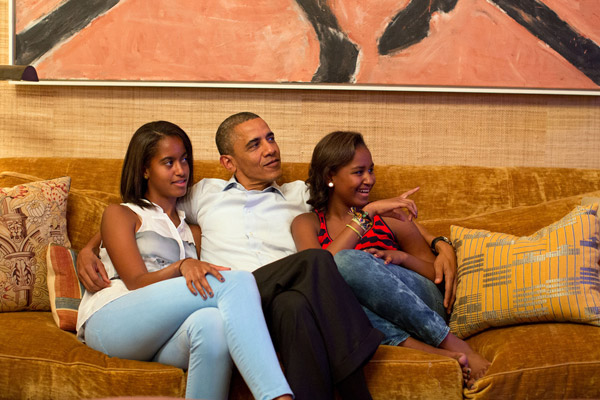
* Bill Clinton: Michelle Obama is an excellent model if you are learning public speaking. Bill Clinton is the graduate course. The way he telegraphs his killer lines by squinting one eye—it's like Jordan wagging his tongue. Whatever comes next is something only he can pull off.
* Joe Biden: One passage in Biden's speech was, for me, the most interesting moment of last night, or even both conventions. Including Clint Eastwood's improv bit. But it might have a lot to do with having grown up around a patrilineal Southern culture of honor (emphasis mine):
In those meetings, I often thought about my dad. My dad was an automobile man [Biden's dad sold used cars]. He would have been one of those guys—all the way down the line—not in the factory—not along the supply chain—but one of those guys selling American cars to the American people. I thought about what this crisis would have meant for the mechanics, the secretaries, the sales people who he managed. And I know for certain, that if my dad were here today, he would be fighting for this President, who fought to save all those jobs, his job, and the jobs of all the people he cared about. He would respect Barack Obama for having the guts to stand up for the automobile industry, when others walked away.
When I look back now on the President’s decision, I also think of another son of an automobile man–Mitt Romney. Mitt Romney grew up in Detroit. His father ran American Motors. Yet he was willing to let Detroit go bankrupt. It’s not that he’s a bad guy. I’m sure he grew up loving cars as much as I did. I just don’t think he understood—I just don’t think he understood what saving the automobile industry meant-to all of America. I think he saw it the Bain way. Balance sheets. Write-offs.
A lot of the attacks on Romney during the DNC have been couched in cornball jokes: "Mitt Romney has so little economic patriotism that even his money needs a passport. TRY THE VEAL. NO, TRY IT." But that? Them's fighting words. That's the sort of thing that used to cause generations-long feuds. Not reflected in the prepared remarks was where he silenced the crowd for the second paragraph so they could hear the knife go in.
* Barack Obama: Given that Obama practically made his national career with a rousing bit of oratory, the commentariat I was following live last night was a bit disappointed at first to find that he was giving a State of the Union address more than a convention speech. Even the rhetorical flourishes were modest:
If you believe that new plants and factories can dot our landscape; that new energy can power our future; that new schools can provide ladders of opportunity to this nation of dreamers; if you believe in a country where everyone gets a fair shot, and everyone does their fair share, and everyone plays by the same rules, then I need you to vote this November.
It was less designed to elicit cheers of USA than THAT SOUNDS GOOD. Obama even suggested it's the sort of speech one gives after four years as president:
I’m no longer just a candidate. I’m the President…. If the critics are right that I’ve made all my decisions based on polls, then I must not be very good at reading them. And while I’m proud of what we’ve achieved together, I’m far more mindful of my own failings, knowing exactly what Lincoln meant when he said, “I have been driven to my knees many times by the overwhelming conviction that I had no place else to go.”
Obama closed his 2012 DNC speech with an echo of his 2008 speech, but there was a shift in tone, in rhetoric. In the former, he evoked Martin Luther King, part of his oratorical American heritage:
"We cannot walk alone," the preacher cried. "And as we walk, we must make the pledge that we shall always march ahead. We cannot turn back."
…America, we cannot turn back. We cannot walk alone. At this moment, in this election, we must pledge once more to march into the future. Let us keep that promise – that American promise – and in the words of Scripture hold firmly, without wavering, to the hope that we confess.
This year he returned to that metaphor:
America, I never said this journey would be easy, and I won’t promise that now. Yes, our path is harder – but it leads to a better place. Yes our road is longer – but we travel it together. We don’t turn back. We leave no one behind. We pull each other up. We draw strength from our victories, and we learnfrom our mistakes, but we keep our eyes fixed on that distant horizon, knowing that Providence is with us, and that we are surely blessed to be citizens of the greatest nation on Earth.
As a candidate, Obama was the insurgent dreamer. After a term as president, he turned toward that other great orator, the other half his rhetorical heritage, on his knees in a divided country.
Photograph: The White House


